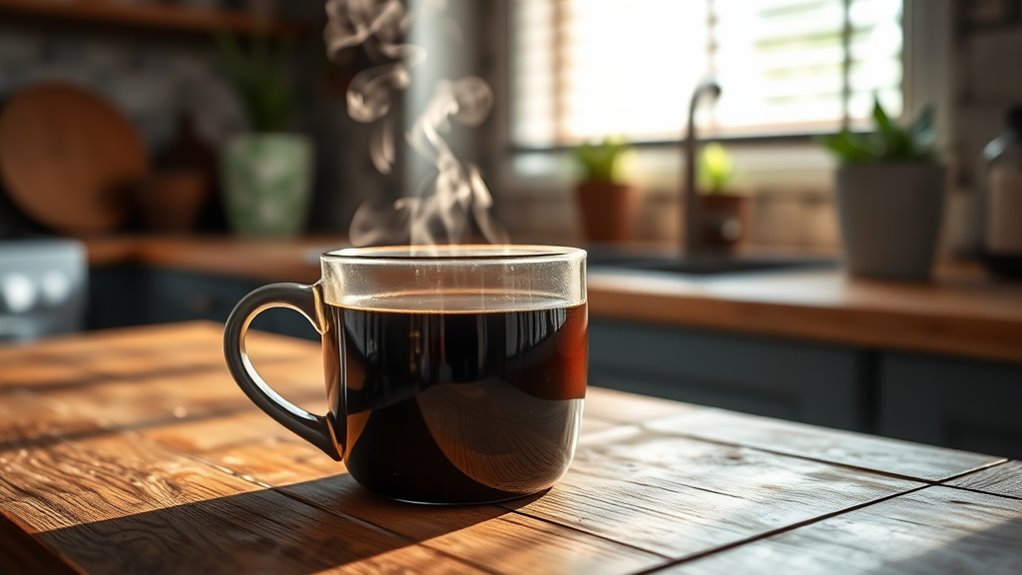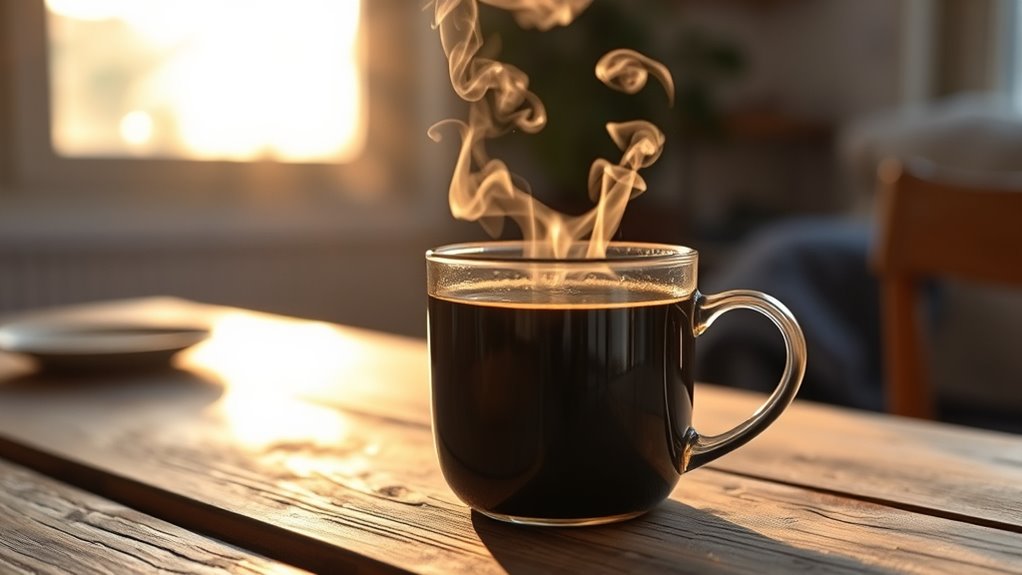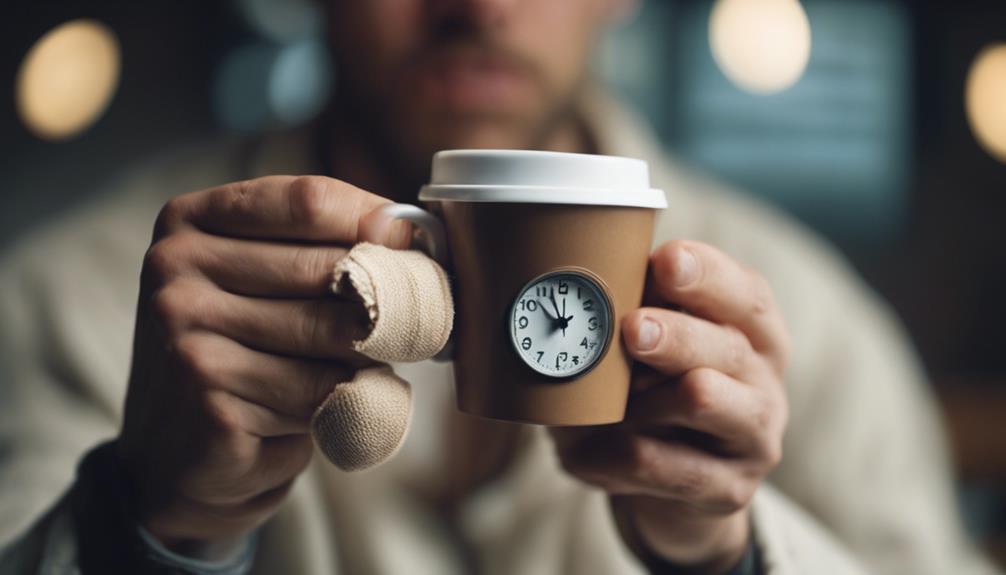The best time to drink coffee is during mid-morning or early afternoon when your natural energy dips, helping you stay alert. Avoid caffeine at least six hours before you plan to sleep to prevent disruptions. Personal factors like metabolism and sensitivity also matter, so pay attention to how your body reacts. If you follow these guidelines, you’ll support better energy and sleep cycles—continue on to discover more ways to optimize your caffeine intake.
Key Takeaways
- Consume coffee mid-morning or early afternoon to align with natural energy dips for optimal alertness.
- Avoid drinking coffee within 6 hours of bedtime to prevent sleep disruption from lingering caffeine effects.
- Tailor your coffee timing based on personal metabolism; faster processors can consume later without sleep issues.
- Monitor your body’s reactions, such as jitters or stomach upset, to adjust caffeine intake timing for better health.
- Using natural energy lows as cues for coffee intake maximizes benefits while minimizing negative effects.

Have you ever wondered when is the best time to enjoy your coffee? The answer largely depends on your body’s coffee metabolism and the ideal caffeine timing to maximize benefits while minimizing any negative effects. Your body processes caffeine at different rates depending on your unique physiology, so understanding when to drink coffee can help you stay alert without disrupting your sleep or causing jitters.
Caffeine peaks in your bloodstream roughly 30 to 60 minutes after you sip your coffee. This is when you’ll feel its energizing effects most strongly. However, if you drink coffee too late in the day, your caffeine metabolism might still be in full swing, making it harder to fall asleep or reducing the quality of your rest. To avoid this, it’s best to plan your coffee intake so that your caffeine levels decline well before bedtime. Generally, cutting off caffeine at least 6 hours before you plan to sleep gives your body enough time to clear it out, ensuring you wake up refreshed rather than restless.
Timing is also essential for aligning with your natural energy cycles. Many people notice a dip in alertness during the mid-morning or early afternoon, which is often when a coffee boost can be most effective. Drinking coffee during these windows helps you ride out the natural lull in your energy levels, thanks to the way caffeine interacts with your brain’s adenosine receptors. But, if you’re someone who’s sensitive to caffeine, you might find that even a morning coffee can interfere with your sleep later on. In that case, adjusting your caffeine timing to earlier in the day is wise.
Your coffee metabolism can also vary based on factors like age, genetics, and liver function. Some people process caffeine quickly, enjoying multiple cups throughout the day without trouble. Others metabolize it slowly, meaning even a single cup could linger in their system for hours. Knowing your own response helps you determine the best times to drink coffee. For instance, if you notice jitters or stomach upset after certain times, it’s a sign to adjust your caffeine timing accordingly. Additionally, understanding your caffeine metabolism rate can help optimize your consumption pattern for better health and alertness. Being aware of your individual caffeine processing rate allows you to tailor your coffee intake to fit your lifestyle and health needs.
Frequently Asked Questions
Does Drinking Coffee Affect Sleep Quality?
Drinking coffee can affect your sleep quality by causing sleep disruptions, especially if consumed late in the day. Caffeine dependence might make it harder to fall asleep or stay asleep, leading to poorer rest overall. To minimize these effects, try limiting caffeine intake in the afternoon and evening. Being mindful of how caffeine affects your sleep helps you enjoy coffee without sacrificing rest and overall health.
Is Decaffeinated Coffee a Healthier Option?
Decaffeinated coffee can be a healthier option if you’re sensitive to caffeine’s effects. It offers decaffeinated benefits like reduced jitters and better sleep, while still providing antioxidants. However, consider health implications such as possible chemical residues from processing. If you want to enjoy coffee without the caffeine buzz, decaffeinated coffee might be the right choice, but always check for quality to maximize its health benefits.
How Does Coffee Impact Hydration Levels?
Imagine you’re a knight guarding your hydration balance. Coffee, with its caffeine diuretic properties, can make you lose more fluids through urination. While moderate coffee consumption typically doesn’t cause dehydration, drinking large amounts may tip the scales. It’s best to balance your coffee intake with water, especially if you’re active or in hot weather, to stay properly hydrated and keep your body’s hydration levels steady.
Can Coffee Consumption Cause Anxiety or Jitters?
You might notice that coffee causes anxiety or jitters, especially if you’re sensitive to caffeine. Caffeine sensitivity varies from person to person, so what triggers anxiety in one person might not in another. If you tend to experience anxiety triggers after drinking coffee, consider reducing your intake or switching to decaffeinated options. Monitoring your body’s response helps you enjoy coffee without discomfort, ensuring you’re aware of how caffeine affects your mood.
Does Coffee Intake Influence Digestion or Stomach Health?
You might notice that coffee can influence your digestion or cause stomach discomfort. Coffee stimulates stomach acid, which can lead to digestion issues or heartburn, especially if you have a sensitive stomach. Drinking on an empty stomach may worsen these effects. To protect your coffee stomach, consider reducing intake or pairing coffee with food. Monitoring your body’s response helps you enjoy coffee without compromising your digestion.
Conclusion
So, now that you know when to sip your coffee for maximum health benefits, imagine what could happen if you ignore these timing tips. Will you miss out on feeling more energized and balanced? Or could you unknowingly disrupt your natural rhythm? The choice is yours—your perfect coffee moment awaits, but only if you’re willing to unfasten its true potential. Are you ready to savor coffee at just the right time and see what’s possible?









